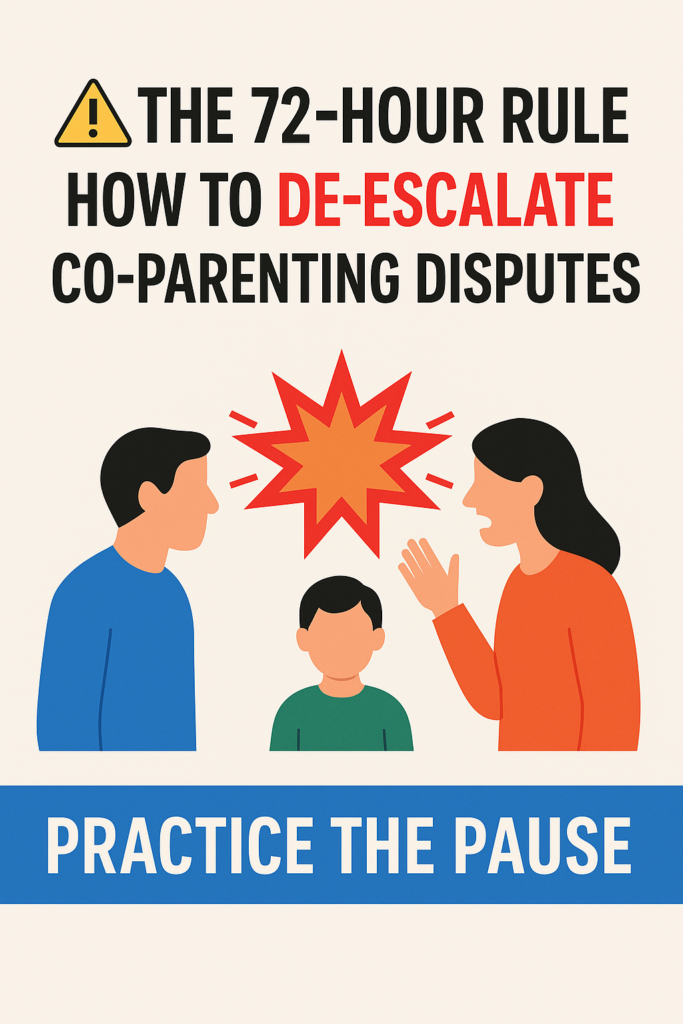
When I first stepped into high-conflict co-parenting, my phone might as well have been a landmine. A message would pop up, and before I even finished reading, I was already hammering out a reply. Every ding of a notification felt like a challenge to defend myself or prove a point.
The result? Instant replies, emotional blowups, and eventually—court filings. My words weren’t protecting my kids; they were fueling conflict.
The hardest part was the feeling that if I didn’t respond right away, I was losing the argument. That’s the fallacy: believing strength is found in winning the last word. In reality, strength is found in removing oxygen from the fire. When you step back, the flames can’t keep burning.
That’s when I discovered what I now call the 72-Hour Rule: unless it’s about your child’s immediate health or safety, you do not need to respond for three days. That simple pause changed everything. I wasn’t losing ground by waiting—I was gaining peace and clarity.
Why the 72-Hour Rule Works
Waiting to respond feels unnatural at first. Our instinct is to defend ourselves, correct the record, or set the other parent straight. But co-parenting isn’t about winning arguments—it’s about creating stability for your kids. And stability doesn’t come from rapid-fire texts; it comes from thoughtful, measured responses.
The pause works because it allows stress hormones to subside. When emotions settle, logic returns. By holding back, you respond with clarity instead of impulse.
With practice, this restraint stops feeling like white-knuckling willpower and starts becoming a habit. And over time, it becomes one of many small but powerful variables that promote lasting peace in co-parenting.
Parenting Plan Protocols: Making It Enforceable
The 72-Hour Rule is powerful as a personal habit, but it’s strongest when written into the parenting plan through a clear communication protocol. Without structure, silence can be weaponized: “You ignored me!” With protocols, acknowledgment and timelines are defined so no one has to guess.
Here’s the basic protocol I built for myself, which I now use variations of with coaching clients:
1. Routine Communication
All non-emergency communication goes through the agreed parenting app (TalkingParents, OurFamilyWizard).
A read receipt = acknowledgment.
Parents have up to seventy-two (72) hours to provide a substantive reply.
2. Emergency Communication
Emergencies mean immediate health, safety, or welfare concerns.
Phone or text is permitted, but follow-up must be documented in the app within 24 hours.
Parents should make reasonable efforts to respond as soon as practicable.
3. Boundaries
Consolidate updates into one daily message when possible.
No excessive or harassing communication.
4. Documentation & Accountability
The parenting app serves as the official record.
Parents understand communication logs may be admissible in court.
5. The 72-Hour Rule
Both parents agree to the 72-hour response window for routine matters.
This pause de-escalates conflict and promotes clarity.
Action Step: Practice the Pause
Start with one commitment: the next time you get a message that spikes your pulse, do nothing. Don’t reply, don’t defend, don’t explain. Just breathe. Let the notification sit.
Write “72-Hour Rule” on a sticky note and place it above your phone or computer. That little reminder will catch your eye before your fingers fly. With each pause, you’re retraining yourself to choose peace over impulse.
At first, it feels like resistance training—heavy, uncomfortable, unnatural. But over time, it strengthens you. The pause becomes a habit. The habit becomes a rhythm. And the rhythm becomes peace. Weeks from now, you’ll notice the fire fizzles before it ever catches. Months from now, you’ll realize your kids feel more secure because the temperature in the house has dropped.
Call to Action: From Habit to Strategy
The 72-Hour Rule is one piece of the puzzle. Peace isn’t built on willpower alone—it’s built on structure. That’s why I created the Ironclad Parenting Plan Strategy Kit.
I designed this resource because no two families face disruption the same way.
If you’re ready to stop reacting and start leading, the Ironclad Kit is your roadmap. Imagine six months from now, looking back at all the battles that never even happened—because you had structure, clarity, and a plan that worked.
🔄Did you find this article helpful? Share it!

About the Author - Danny DeJesus
Danny De Jesus is a transformational resilience thought leader, strategic thinker, and the founder of Elevatus Coaching—a practice built to help people rebuild their lives after major change. Drawing from his own experiences with divorce, co-parenting, and career shifts, he created the C2R2E Framework to guide people from collapse to elevation with clarity and confidence. Through the Elevatus Blog, he shares insights for anyone navigating disruption, rebuilding direction, or shaping a new chapter with purpose.
